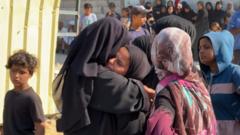Israel's recent humanitarian aid measures in Gaza, following international criticism, raise questions about their effectiveness and true motivations.
Aid Measures by Israel: Humanitarian Gesture or Tactical Deception?

Aid Measures by Israel: Humanitarian Gesture or Tactical Deception?
Societal Reaction to Israel's Aid Approach Amid Gaza's Dire Conditions
Israel has announced a series of measures to address the mounting international outcry regarding the humanitarian crisis in Gaza, specifically accusations of starvation inflicted on the territory. Acknowledging escalating condemnation, the Israeli Defence Forces (IDF) declared plans to airdrop essential supplies, initiating with a nighttime operation and permitting the United Arab Emirates air force to assist with further drops.
In addition, the IDF outlined a "tactical pause" in military operations in selected areas and promised the creation of "designated humanitarian corridors" to counter claims of intentional starvation tactics. However, Hamas has labeled these efforts as insincere, alleging they are merely a façade for the Israeli government’s international reputation.
Despite Israel's insistence that it bears no responsibility for the humanitarian turmoil in Gaza and that aid is flowing freely, this narrative fails to resonate with many of its closest allies, including nations from Europe and various United Nations bodies active in the region. Critics argue that the new measures may signify a reluctant admission of the necessity for a substantive improvement in aid delivery, primarily aiming to appease those allies who have issued pointed critiques implicating Israel in the prevailing starvation crisis.
A joint statement from the United Kingdom, France, and Germany has called for immediate action from Israel to dismantle barriers hindering aid delivery and to enable humanitarian organizations to operate without obstruction. Since implementing a full blockade on aid into Gaza, Israel has imposed stringent regulations on the type and movement of permitted aid shipments, introducing the Gaza Humanitarian Foundation (GHF) with American assistance to replace the traditional United Nations-led distribution network. Israel contends that Hamas misappropriated supplies intended for humanitarian aid, yet the United Nations has criticized this GHF initiative as inhumane.
Reports indicate that several Palestinians, exceeding 1,000, have been fatally shot while desperately seeking food amid this scenario, highlighting the risky conditions surrounding humanitarian efforts. Jonathan Whittall from the UN's Office for the Coordination of Humanitarian Affairs has condemned the operational methodologies of the GHF and has expressed severe concerns regarding the general situation in Gaza, describing it as unprecedentedly dire.
While airlifts of food supplies may be seen as a desperate last resort, experts emphasize that true relief for the people of Gaza requires sustained ceasefire conditions and unobstructed long-term aid operations. As conditions worsen, many call for immediate access for meaningful humanitarian assistance rather than temporary measures reminiscent of past conflicts where aerial aid deliveries often resulted in chaos and danger for desperate civilians.
In Gaza, where population density continues to rise amid ongoing military activities, the reality for those affected is increasingly grim. The precarious situation, compounded by limited living space and overwhelming demand for basic necessities, renders air-drop solutions an inadequate response to the crisis. With futures hanging in the balance, significant international oversight may ultimately dictate the potential for survival and recovery for the beleaguered populace in Gaza.
In addition, the IDF outlined a "tactical pause" in military operations in selected areas and promised the creation of "designated humanitarian corridors" to counter claims of intentional starvation tactics. However, Hamas has labeled these efforts as insincere, alleging they are merely a façade for the Israeli government’s international reputation.
Despite Israel's insistence that it bears no responsibility for the humanitarian turmoil in Gaza and that aid is flowing freely, this narrative fails to resonate with many of its closest allies, including nations from Europe and various United Nations bodies active in the region. Critics argue that the new measures may signify a reluctant admission of the necessity for a substantive improvement in aid delivery, primarily aiming to appease those allies who have issued pointed critiques implicating Israel in the prevailing starvation crisis.
A joint statement from the United Kingdom, France, and Germany has called for immediate action from Israel to dismantle barriers hindering aid delivery and to enable humanitarian organizations to operate without obstruction. Since implementing a full blockade on aid into Gaza, Israel has imposed stringent regulations on the type and movement of permitted aid shipments, introducing the Gaza Humanitarian Foundation (GHF) with American assistance to replace the traditional United Nations-led distribution network. Israel contends that Hamas misappropriated supplies intended for humanitarian aid, yet the United Nations has criticized this GHF initiative as inhumane.
Reports indicate that several Palestinians, exceeding 1,000, have been fatally shot while desperately seeking food amid this scenario, highlighting the risky conditions surrounding humanitarian efforts. Jonathan Whittall from the UN's Office for the Coordination of Humanitarian Affairs has condemned the operational methodologies of the GHF and has expressed severe concerns regarding the general situation in Gaza, describing it as unprecedentedly dire.
While airlifts of food supplies may be seen as a desperate last resort, experts emphasize that true relief for the people of Gaza requires sustained ceasefire conditions and unobstructed long-term aid operations. As conditions worsen, many call for immediate access for meaningful humanitarian assistance rather than temporary measures reminiscent of past conflicts where aerial aid deliveries often resulted in chaos and danger for desperate civilians.
In Gaza, where population density continues to rise amid ongoing military activities, the reality for those affected is increasingly grim. The precarious situation, compounded by limited living space and overwhelming demand for basic necessities, renders air-drop solutions an inadequate response to the crisis. With futures hanging in the balance, significant international oversight may ultimately dictate the potential for survival and recovery for the beleaguered populace in Gaza.


















